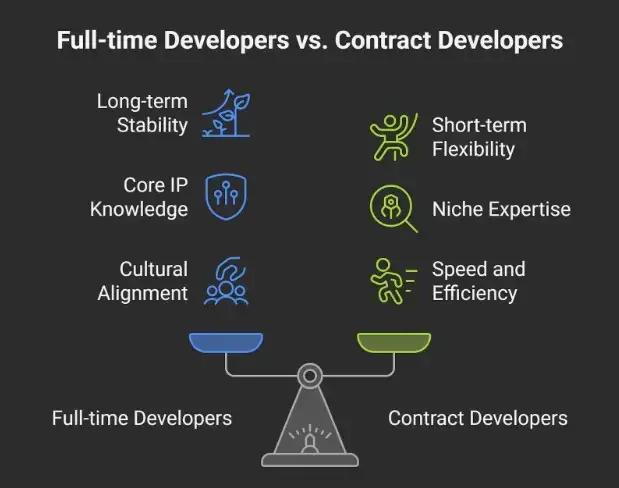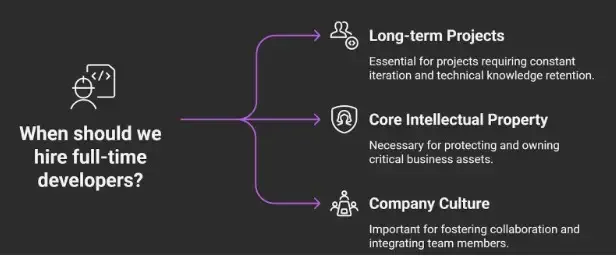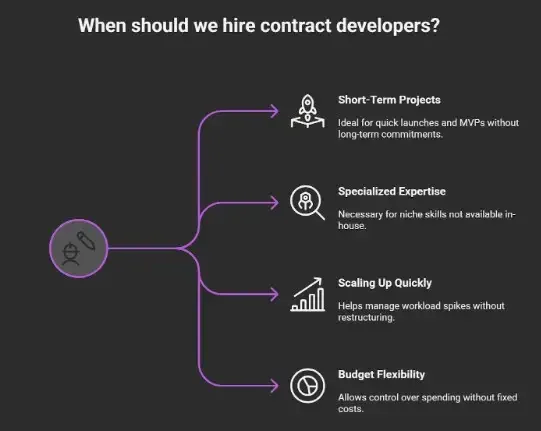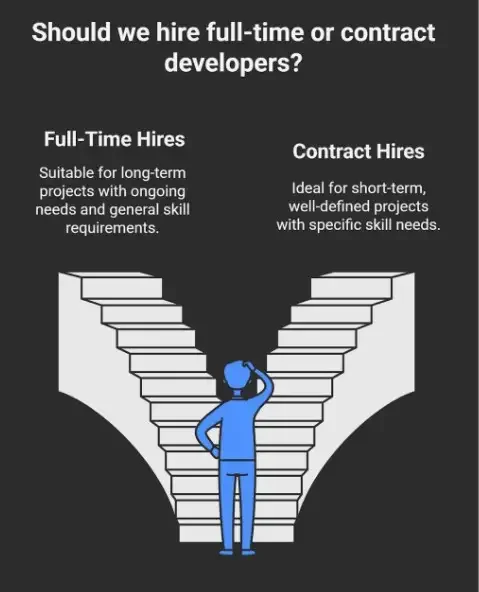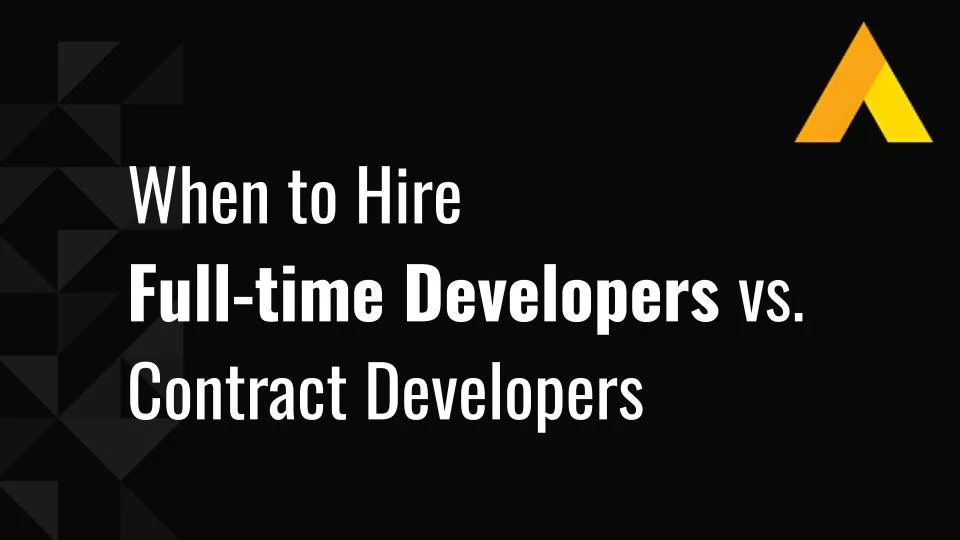When to Hire Full-time Developers vs. Contract Developers
Hiring dev talent comes with high stakes. The wrong model can slow your roadmap, inflate costs, or put your intellectual property at risk.
Some teams over-hire too soon. Others depend on freelancers for far too long. Either way, execution suffers.
The decision between full-time developers vs. contract talent affects more than headcount. It impacts budget control, project timelines, and the retention of critical knowledge. And most companies underestimate that.
You’re on the right page to make the right decision, though.
This article breaks down how both models work, when to use each, and what to consider before you commit.
Let’s take a look.
Pro Tip: Deciding is only the first step. Sourcing the right talent requires a strategy. Explore these best practices for sourcing tech talent to see how top firms, including Alpha Apex Group, approach developer recruitment and contractor sourcing at scale.
TL;DR
In a hurry? Start with the key points:
A full-time developer integrates into your team, retains knowledge, and supports long-term product growth.
A contractor delivers short-term results, niche expertise, and flexibility without overhead.
Key signs you need a full-time developer: complex projects, ongoing updates, IP protection, and culture-driven collaboration.
Key signs you need a contractor: MVPs, proofs of concept, workload spikes, or specialized skills like AI or cybersecurity.
Costs differ: full-time hires require salaries, benefits, and onboarding. Contractors charge higher hourly rates but come without long-term obligations.
Risks exist on both sides: tenure drops for full-time employees, while contractors may leave with valuable context.
The best approach for many teams is hybrid: build a strong core with full-time developers and scale capacity with contractors when needed.
Before deciding, clarify your budget, project scope, and choose if speed or stability matters most.
What Is the Difference Between a Full-Time Developer and a Contract Developer?
Choosing between a full-time developer and a contractor goes beyond employment terms (although these are important, too). It defines team rhythm, knowledge flow, and how flexible you can be as projects evolve.
Knowing the difference helps you hire smarter and manage delivery with confidence.
What are Full-time Developers?
Full-time developers are permanent team members. They receive a salary, go through onboarding, and become part of your product’s evolution.
Their responsibilities don’t end with shipping code. Actually, they’re expected to understand the business, maintain the product long-term, and contribute to system improvements as your needs change.
They usually take part in planning sessions, retrospectives, technical interviews, and product reviews. Over time, they connect the dots (your systems, standards, and workflows), so they can take real ownership instead of waiting for direction.
Here’s what that looks like on a day-to-day basis:
Hiring full-time developers takes longer and requires more investment.
There’s just one problem:
According to the U.S. Bureau of Labor Statistics, the median tenure for wage and salary workers has dropped to 3.9 years, the lowest level in over two decades.
That means long-term doesn’t mean forever, but it still offers more continuity than short-term contracts.
What are Contract Developers?
Contract developers are hired for a defined period, usually tied to a specific deliverable or skill gap. They’re typically brought in for their technical expertise or availability, not for long-term alignment with company goals.
Contractors operate independently. They’re responsible for delivery, not for the company’s roadmap or culture. Their productivity depends on how clearly scoped the work is. Done right, this model lets you move fast and stay lean.
Recently, freelance and contract work has gained traction in tech.
Upwork reports that 28% of skilled knowledge workers now operate outside traditional employment, and a majority of them cite better compensation, flexibility, and autonomy as key drivers.
These developers typically work across multiple industries and bring a level of specialization that’s difficult to match in-house.
Full-time vs. Contract Developers: Key Differences at a Glance
The choice between a full-time developer and a contractor changes how your team scales, how you manage delivery, and what kind of long-term value you retain.
The basics are clear: one is permanent, the other temporary. But the operational impact runs deeper.
Let’s break down three areas where the difference shows up immediately:
Benefits: Full-time developers typically receive health coverage, PTO, equity, and retirement contributions. Contractors don’t. That makes contract work leaner from a company cost perspective, but less stable from a worker’s side. Depending on your geography, legal obligations around benefits can add 20–30% to a full-time developer’s total compensation.
Training: In-house developers are part of your growth model. They attend internal training, join tech workshops, and follow development plans. Contractors are hired to perform, not to learn. You’re not expected to train them, and they usually don’t stick around long enough to benefit from those resources anyway.
Career growth: Full-time devs move through titles, from mid-level to senior, to tech lead or engineering manager. Their responsibilities expand, and you invest in keeping them motivated and aligned. Contractors are project-focused. Their growth happens outside your organization, usually through broader portfolios or new contracts, not through your internal ladders.
Pro Tip: Hiring models shapes budgets and, more importantly, culture. Alpha Apex Group runs proprietary culture diagnostics to align talent with processes. This strengthens engagement and retention, and it’s an element that may be overlooked when comparing full-time developers and contractors.
When Should You Hire Full-time Developers?
Hiring full-time developers makes sense when the work requires continuity, long-term strategic alignment, and a tight feedback loop between product, engineering, and business teams.
These are not transactional hires. They’re foundational team members who help shape how the company builds and ships over time. Let’s put it in context:
Long-term Projects with Evolving Needs
Software products that require constant iteration need developers who understand context. If your project will evolve over the next 12 to 24 months, with new features, scaling challenges, security updates, or performance improvements, having a consistent team in place pays off.
Bringing in a different contractor every time something breaks or changes creates inefficiencies. Full-time developers retain technical knowledge, document decisions, and build systems with maintainability in mind.
The continuity they bring improves efficiency and shortens onboarding with every sprint.
And this matters, since Atlassian’s 2025 Developer Experience report found that 90% of developers lose at least 6 hours every week to inefficiencies. Much of it is caused by knowledge gaps and repeated context switching, and that’s what you want to avoid.
Building Core Intellectual Property
When the code you’re building represents core business value, be it a proprietary algorithm, a critical backend service, or your entire product, ownership matters. You want to retain as much of that development in-house as possible.
This goes beyond control. It also touches trust, security, and internal decision-making. Contractors might deliver solid code, but they won’t be part of the longer-term conversations around architecture, tech debt, or strategic shifts.
Protecting intellectual property starts with who you trust to build it. For that reason, full-time developers are a safer bet when the work has long-term value tied to company growth or valuation.
That’s especially important when you consider that 35.5% of all data breaches in 2024 were traced back to third-party compromises. This exposes how, in fact, external code relationships directly risk your IP and systems.
Company Culture and Collaboration
Full-time team members participate in more than code delivery. They shape how the company operates. They help onboard new hires, lead sprint planning, suggest better tooling, and improve internal processes.
Collaboration doesn’t always translate well with temporary contracts. If your team values culture fit, shared rituals, and deep integration, contractors will always feel one step removed. Full-time developers build shared habits that support long-term delivery.
Pro Tip: Building a stable dev team goes beyond technical capability. In scaling or post-acquisition contexts, alignment is critical. Alpha Apex Group helps organizations integrate new hires into the culture while protecting the long-term value of their intellectual property.
When Should You Hire Contract Developers?
There are situations where full-time hiring creates more friction than value. If your project is short, tightly scoped, or requires highly specialized expertise, contract developers can deliver better outcomes faster.
The key is knowing where this model adds speed without introducing unnecessary risk:
Short-Term or Specialized Projects
When you need to launch quickly, test a new product feature, or build an MVP, a contractor helps you move without the weight of long-term commitments. They’re used to jumping into projects mid-stream, delivering under pressure, and working with minimal onboarding.
This model also makes sense when the project calls for skills your current team doesn’t have. AI model fine-tuning, blockchain integrations, cybersecurity audits, or complex data infrastructure are all examples where a niche contractor can step in, solve the problem, and step out.
And the trend supports it.
In fact, 41% of employers plan to expand their use of contractors for task-specialized work by 2025, particularly in high-skill areas where internal teams lack capacity or expertise.
If you scope the work clearly and manage it well, contract developers are efficient. They don’t require training, and they’re paid only for delivery.
Scaling Up Quickly
Growth creates bottlenecks. When your backlog piles up or your sprint velocity drops, contract talent helps you scale without restructuring your entire team.
Bringing in a few senior developers on a contract basis can help cover workload spikes, especially during product launches, system migrations, or seasonal surges. You don’t need to budget for long-term salaries or benefits, and you can scale down as soon as the work is done.
This gives product teams breathing room while keeping internal devs focused on priority items. This is important, given that nearly 73% of software developers report having experienced burnout at some point in their careers
Budget Flexibility
Contracting isn’t always cheaper, but it offers more control over how and when you spend. You can allocate budget to delivery milestones rather than committing to fixed monthly costs. That way, you avoid overhead for benefits, office space, and long onboarding cycles.
It’s also easier to predict and adjust spend.
If a project shifts or gets postponed, you can pause the engagement without going through offboarding procedures or risking morale.
That said, hourly rates for top contractors can be high. The real advantage comes when you need to move fast without taking on long-term financial commitments.
Speaking of costs, let’s see:
How Do Costs Compare Between Developers and Contractors?
Cost comparisons between full-time and contract developers aren’t always simple. Hourly rates are only one piece of the puzzle. You also need to factor in onboarding, benefits, retention, and the impact of delivery speed on ROI. Let’s see why:
Salary vs Hourly/Daily Rates
Full-time developers earn a fixed salary, plus additional costs tied to employment, benefits, taxes, bonuses, training, and tools. In the US, the median wage for full-time developers is about $131,000/ year, according to the Bureau of Labor Statistics. This brings the hourly pay to $63.
Contractors may charge a similar amount per hour (though sometimes significantly less, and other times significantly more). In fact, freelance / contract devs in the US charge $45–$75/hr for general work, with specialized experts commanding $100+/hr.
The benefit, though, is that they don’t require long-term investment. You’re paying only for time worked or deliverables completed. In short engagements, that can mean significant savings.
But if the contractor stays for six months or more, the financial gap narrows. At that point, full-time hiring may offer better value over time.
Hidden Costs to Consider
Hiring full-time adds complexity.
You’ll need time for interviews, technical assessments, and internal approvals. In tech, this process can stretch for weeks. Research from Josh Bersin, US human resources adviser, shows the average time-to-hire in the U.S. is 45 days, and for tech roles, it’s even longer.
Once the developer joins, you’ll spend time on onboarding, training, and integration.
If they leave early, the cycle starts again.
Besides, you pay more to hire them. According to SHRM data, the average cost-per-hire is over $4,000 in recruitment and onboarding fees alone. For executives, recruiting costs go over $30,000.
Contractors also come with hidden costs.
Some work through agencies that charge placement fees. Others may not be available to renew when you need them. If knowledge walks out the door mid-project, you may need to rebuild that context from scratch.
ROI Perspective
The real question is where the return justifies the spend. Full-time developers deliver more value when they stay long enough to absorb systems, influence processes, and contribute beyond their tasks. Contractors deliver faster results when the project is scoped tightly and doesn’t require long-term continuity.
If you're optimizing for speed, niche expertise, and short-term cost control, contractors offer a leaner approach. But for sustained output and IP protection, full-time remains the better long play.
Pro Tip: Balancing the cost of full-time hires and contractors can be easier with the right partner. See our breakdown of the top 10 software engineer staffing agencies to understand how specialized firms streamline hiring and reduce overhead. Alpha Apex Group is featured for helping companies scale with precision.
Which Option Offers More Flexibility and Control?
Flexibility and control sit at opposite ends of the hiring spectrum. Contractors give you adaptability, while full-time developers give you oversight and alignment. The decision depends on how you want to balance speed with consistency. Here’s how it plays out:
Flexibility of Contractors
Contract developers are quick to hire and easy to release. They allow you to adjust resources with market shifts, project delays, or sudden growth. This makes them ideal when demand is unpredictable or when you want to test new technologies without locking in headcount.
Their adaptability also means you can bring in specific skills for a defined project. Once it’s done, you move on without long-term obligations. That level of flexibility is hard to match with full-time employment.
Control with Full-Time Developers
Full-time developers provide stronger oversight. They work under your processes, follow internal review systems, and align with your security standards. They’re easier to integrate into larger company initiatives, such as enterprise-wide digital transformation or scaling a proprietary product.
Control also comes from accountability. Full-time employees have more at stake in company performance and tend to commit to long-term outcomes, not just short-term deliverables.
Engagement Model
The engagement model defines how work is prioritized and who holds decision-making power. Contractors typically operate on a project basis with fixed deliverables. This offers efficiency but limits their influence over product direction.
Full-time developers are embedded in your roadmap. They contribute to long-term product vision, knowledge retention, and organizational growth. If you need developers who can influence architecture decisions or guide technical standards, full-time employment is the stronger model.
Flexibility gets you output. Control gets you alignment. The right balance depends on how strategic the role is to your product.
Pro Tip: Flexibility without structure creates exposure. Alpha Apex Group’s executive consulting supports leaders in balancing contractor agility with the oversight of full-time developers. We always make sure that your short-term execution aligns with your long-term business goals.
What Are the Risks of Each Hiring Model?
Both hiring models carry risks. The difference lies in where the exposure falls: short-term delivery for contractors, long-term investment for full-time developers. Knowing these risks helps you plan mitigation strategies before issues surface:
Risks with Contractors
The biggest challenge with contract developers is knowledge drain. Once the project ends, they take their context with them. Unless you’ve enforced proper documentation and code handover, your team may face delays when the next iteration begins.
Contractors also have less attachment to company goals. Their priority is delivering within scope, not aligning with strategic direction. This can create gaps if the work touches critical systems or requires collaboration with multiple teams.
And it matters, because business units with highly engaged employees report about 22% higher productivity than those with lower engagement.
Risks with Full-Time Developers
As we explained above, full-time developers come with higher fixed costs. Salaries, benefits, and training represent a significant investment. If project demand drops or shifts, you may face underutilization, where developers are paid but not working at full capacity.
There’s also a risk tied to hiring cycles.
As the Bureau of Labor Statistics stated, the median tenure for U.S. employees is under four years. Even with full-time staff, turnover is a reality, and each departure resets recruitment and onboarding costs.
Mitigating Risks
The best way to reduce risk is through hybrid models. Many companies maintain a core team of full-time developers for strategic work and bring in contractors for spikes or specialized needs.
You can also protect yourself by enforcing knowledge transfer processes, writing detailed contracts, and integrating contractors into documentation workflows. With the right systems, both models become safer and more predictable.
Pro Tip: Recruiting developers brings new challenges, from talent shortages to higher turnover. Our guide to the 7 biggest challenges in IT and tech recruitment shows where most companies struggle, and how Alpha Apex Group supports companies in reducing those risks.
How Do You Decide Between a Developer and vs Contractor?
Choosing between a full-time developer and a contractor comes down to alignment with your business goals. Both models work, but each fits a different scenario. You need to weigh scope, urgency, and long-term ownership before making the call.
But let’s get deeper:
Key decision factors
Several variables help frame the decision:
Project duration and scope. Long-running projects that require ongoing updates and support favor full-time hires. Short, well-defined projects are better suited for contractors.
Budget constraints. Full-time developers require steady payroll and benefits. Contractors can be expensive per hour, but easier to manage for defined projects.
Skill requirements. Generalists who grow with your stack fit a full-time model. Specialists who solve narrow problems are better hired on contract.
Each factor shifts the balance. If speed-to-market is critical, contractors make sense. If ownership and stability matter more, full-time is the safer choice.
Questions to Ask Yourself Before Deciding
Before you decide, step back and ask:
Is this a core business function or peripheral support?
Will the project require continuous maintenance, or is it a one-time build?
Is faster delivery more valuable than building long-term internal expertise?
Answering these questions helps you cut through noise and focus on what drives business impact. You may even find that a blended approach, retaining a small full-time team and layering contractors on demand, gives you the best balance of speed and stability.
Full-Time Developer vs Contractor: Make the Right Choice
The full-time developer vs contractor decision is not a permanent one. It comes down to selecting the model that fits your current stage and priorities.
The strongest approach for many companies is hybrid: a core team of full-time developers supported by contractors when demand spikes or specialized skills are required. This balance protects long-term value while keeping you agile.
At Alpha Apex Group, we help organizations make these decisions with clarity. If you’re ready to align your hiring strategy with growth, reach out to us and take the next step.
FAQs
What is the Main Difference Between a Full-Time Developer and a Contract Developer?
A full-time employee is on payroll, fully integrated into your company’s culture, systems, and roadmap. Meanwhile, a contract worker is hired for a fixed project or period, focusing on output without long-term alignment. The first model prioritizes continuity, while the second prioritizes flexibility.
Which Option is More Cost-Effective for Startups: Full-Time Developer or a Contractor?
For early-stage startups, contractors are usually more cost-effective. You avoid overhead for benefits, training, and office space. This creates immediate cost savings compared to full-time hires.
Some software development companies start with contractors to validate products before investing in a permanent team.
Can Contract Developers Transition Into Full-Time Employees Later On?
Yes. Many companies use a contract-to-hire model, where a contractor proves their skills and fit before being offered a permanent role. This reduces hiring risk but requires clear agreements on expectations, compensation, and transition timelines.
Not all contractors are interested in switching, so alignment is key.
What Skills are Better Suited for Contractors Rather Than Full-Time Hires?
Skills tied to highly specialized or short-term needs (such as niche programming languages, AI model tuning, or blockchain integrations) are better suited for software developer contractors. These projects don’t require permanent roles, but demand expertise you may not have in-house.
How do I Decide if my Project Requires Long-Term Developers or Short-Term Contractors?
Start by mapping project length, budget, and criticality. Long-term work benefits from developers who go through structured onboarding processes and stay aligned with your culture.
Short-term projects can be managed effectively with contractors, but make sure you’re clear on the contract types available so expectations, scope, and costs are transparent.
Can a Hybrid Model of Full-Time Developers and Contractors Work Effectively?
Yes. Many organizations succeed with a hybrid model through staff augmentation. They keep a full-time core team for strategic initiatives and add contractors for temporary needs.
With remote work now standard, blending both models has never been easier. This approach is especially effective for maintaining and scaling enterprise software, where you need continuity but also flexibility for specialized upgrades or integrations.


